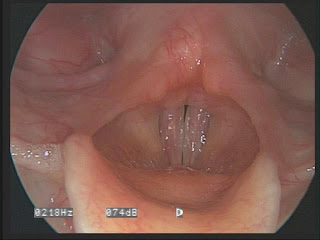6 years ago, I had a successful operation to remove cysts from both of my vocal cords. I documented the recovery process on this blog and found it a great way to share with people what I had gone through and give a good first person account of what the process is like.
After recovering from the surgery, I lived abroad, finished college, spent two years living and performing in Jackson, MS (true story), and even gained a fan following in Jackson, MS as a singer. My voice performed beautifully. When I moved back to the Bay Area and switched career paths, singing continued to play a vital role - songwriting helped me get my first job, and I've written many a joke song since joining Reddit as an engineer.
I didn't think much about my voice, because I haven't had to. But for the past few months, something has been off. Singing was pained (if possible), my high range basically disappeared, I lost my ability to sustain notes for more than 4-6 seconds, and I started losing my voice very quickly.
I went to the doctor about a month ago, and he initially thought I had nodes. Because Kaiser is not UCSF, I had to wait another month to see their only decent speech pathologist. She did a stroboscopy this week, and it turns out that I have a polyp. It may be surgical, it may not be, but I'm back on vocal rest, and I'm not happy.
Apparently, the polyp is more influenced by food/diet habits than the cysts were, so for the foreseeable future, foods I need to avoid include:
- alcohol
- coffee/black tea/caffeine
- chocolate
- citrus
- spicy food
- anything within three hours of going to sleep
Did I mention that I'm not happy?
Last time I dealt with this, I was in college, and it was pretty easy for me to be alone/silent. I had surgery over summer break when I was living with my parents and doing very minimal work. This time, it's different. I work a highly collaborative job where I am very social. The various forums that exist to get help are often in loud rooms, and though there are lots of folks who do the majority of their communication in writing, my brain doesn't really work that way.
I sent this letter to a large group of my colleagues this week as a way to warn them about the massive personality change they are going to see from me. The reaction was overwhelming and positive, with lots of support and encouragement. Pro tip: if you are going to need to go on vocal rest at work, sending this type of information up front and in an easily digestible format will help you get the support you need at the office. And if it doesn't, you work with assholes.
Why I am positing this?
As I've been frantically researching polyps to try to come to terms with my new diagnosis, I've been reminded how few resources exist about vocal injuries from the perspective of people going through the process. I'm reviving this blog so that other folks with vocal injuries can have it as a resource and know they aren't alone, because I know first hand how isolating being suddenly put on vocal rest feels.
I'm hoping that this recovery will also be successful, but who knows. The good folks at UCSF told me that I would likely have a lifelong battle with my vocal cords, and I guess that this is just the start of chapter 2.
Thanks for reading, and I hope to come at you with better news soon!











